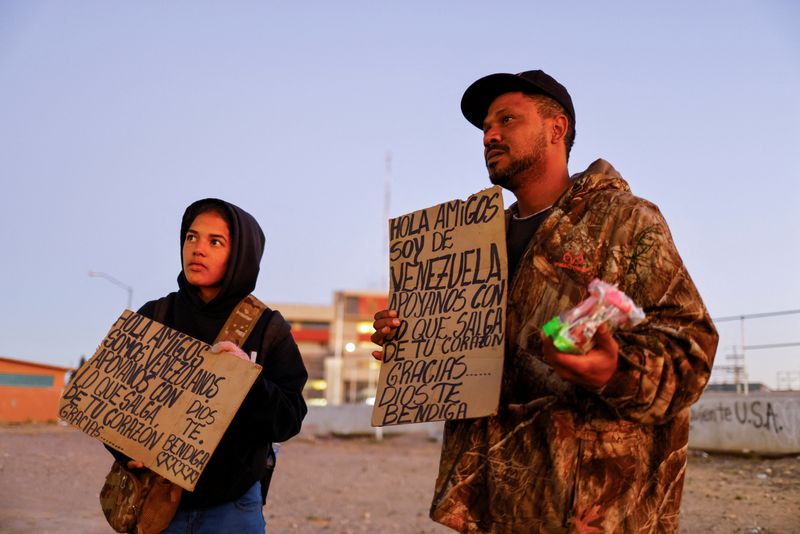By Daina Beth Solomon and Jose Luis Gonzalez
CIUDAD JUAREZ, Mexico (Reuters) - Venezuelan migrant Julio Marquez sells lollipops near the border in the northern Mexican city of Ciudad Juarez, holding a cardboard sign scrawled with marker: "Help us with whatever comes from your heart."
He has the same message for U.S. President Joe Biden, who visits the Texas city of El Paso, just across the border, on Sunday.
"We hope he helps us, that he lets us pass, since we're suffering a lot here in Mexico," said Marquez, 32. "He has to listen to the people on this side."
Biden's first border visit as president comes days after a new policy aimed at reducing illegal migration has been criticized by migrant advocates for limiting asylum access.
The two-pronged approach offers legal pathways to the United States for certain Cubans, Nicaraguans, Haitians and Venezuelans who have U.S. sponsors, while expelling people of those nationalities back to Mexico if they attempt to cross the border without permission.
Mexican migration agents and state police on Saturday patrolled the concrete banks of the Rio Grande river dividing Ciudad Juarez and El Paso, as groups of families attempted to clamber through loops of concertina wire into the United States.
"Duck down," Erlan Garay of Honduras instructed a Colombian woman and her three children, including an 8-year-old boy clutching a Spiderman toy.
"They're going to request asylum, they have a chance," he said, adding that he would look for somewhere else to clandestinely cross, and shrugging off a drop of blood where the fence pricked his hand.
Marquez said he and his partner, Yalimar Chirinos, 19, do not qualify for the new legal entry program because they lack a U.S. sponsor.
"They're constantly changing the laws, every week," Chirinos said, wearing a black hoodie and a single pink-and-blue glove to try to ward off the cold.
The couple has spent five months in Mexico after crossing several countries and the dangerous Darien jungle between Colombia and Panama. They sleep at night on the street without a tent or blankets, hugging one another to stay warm, wary of criminals known to rob and kidnap migrants.
At one point they crossed undetected into Texas, but after several days without food or a place to stay, they turned themselves in to U.S. officials, who sent them back to Mexico.
Marquez said he will stick it out another 15 days hoping to find a legal route into the United States, before looking for a way back to Venezuela.
"I don't want to be here anymore," he said, breaking into tears. "Mr. President, if you're going to deport me, deport me back to my country, not back here to Mexico."

Others were undeterred, even after their own expulsions to Mexico.
"Send me wherever you want, I'll come back," said Jonathan Tovar, 29, speaking on Friday from behind the fence of Mexico's migration office in Ciudad Juarez. "I want the president of the United States to give me and my family a chance."